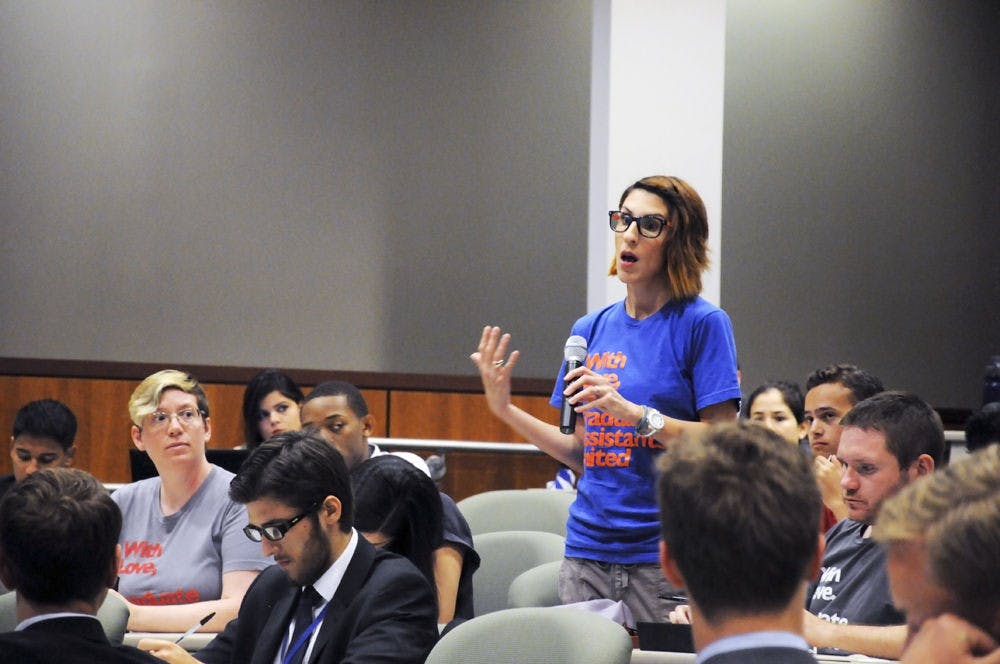A union has filed a grievance, or complaint, against UF for increasing graduate assistants’ health insurance dependents’ premiums by more than 20 percent without discussion.
The changes, which were implemented July 1, violated the contract between the Graduate Assistants United union and UF that wasn’t allowed to be changed until 2017 unless UF sat down with a representative from the union, said Lia Merivaki, the co-president of the union.
UF increased the premium for GatorGradCare, the health insurance provided by UF for graduate students, by 22.8 percent.
The changes affect new and re-enrolling graduate, research and teaching assistants, Merivaki said.
“These decisions were made without consulting with us,” said Merivaki, who expressed disappointment with the school.
Merivaki has a 4-year-old daughter who is covered by other insurance because she couldn’t afford the dependent premium.
UF spokeswoman Janine Sikes wrote in an email that UF has offered graduates free health insurance since 2007 but is now asking that those covered by the plan pay the first $100 of any care they receive from a physician in the GatorGradCare insurance network.
Graduate assistants are given the option to add spouses or children to the insurance plan, Sikes said.
Paula Fussell, vice president of human resources at UF, said there are between 3,700 and 3,800 graduates enrolled in GatorGradCare.
The graduates were told that the premium rates could go up, she said.
“When you have health insurance, it sometimes goes up,” Fussell said. “It’s not unusual for premiums to go up.”
It doesn’t happen always, but it happens often, she said.
About 230 graduates enrolled in GatorGradCare have dependents listed, Fussell said. They are the ones who will see an increase in charges.
Sebastian Sclofsky, an international graduate assistant originally from Uruguay, has watched his GatorGradCare dependents’ premium fees go from about $2,396 to $4,325 for his wife and son since 2011.
Sclofsky makes about $15,000 a year as a graduate assistant in the political science department. He has seen only about a 3 percent increase in salary since 2011 but an overall 80.5 percent increase in insurance.
“In all the countries that I lived, I had health care,” said Sclofsky, who finds it difficult to comprehend the rising costs.
With employee fees and on-campus rent increases, the school pressures graduate assistants to consider other sources of income, he said.
Sclofsky’s second son was born in the U.S. and is covered by Medicaid. Sclofsky, his wife and first son do not qualify under the Affordable Care Act because of their international status.
“We still perform great research,” Sclofsky said. “It’s not an economic question. It’s more of a priority question.”
Merivaki spoke at the Student Town Hall meeting on July 7, where UF President Kent Fuchs was present, listening to students who expressed concerns for the Task Force Committee.
Merivaki addressed the graduate assistants’ employment conditions at UF, citing employment fees as an area to improve for the goal-setting task force.
It is important for UF to consider policies similar to other top institutions, both to improve the working conditions of existing graduate assistants and to attract prospective graduate assistants, she said.
Winfred Phillips, the goal-setting task force chairman and executive chief of staff, thanked her and acknowledged her concerns.
“Certainly outstanding graduate students are part of the preeminence goal,” Phillips said. “There’s no question, and we hear you.”
A chief negotiator for UF has scheduled a grievance hearing as part of the bargaining process.
A date has not been arranged, Fussell said, but UF is working with the union to set one.
Lia Merivaki, a UF political science doctoral student and the co-president for Graduate Assistants United, speaks during the UF student goal-setting town hall meeting on June 7 at the Levin College of Law.






